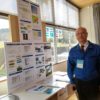In collaboration with the Ministry of the Environment of Japan (MOEJ) and Minamata City in Kumamoto, the pilot study tour was organized on 20-22 November 2018.
The ‘Minamata Convention on Mercury’ was adopted in 2013 at Kumamoto as the international legal framework to reduce mercury related risks and entered into force in 2017. Since then, under the ‘MOYAI initiative’ led by the MOEJ, technical assistance for developing countries and info-sharing and interactions with Minamata have been implemented. Minamata City is marked with the insightful experiences of overcoming Minamata Disease and has transformed into an outstanding ‘Model Environmental City’ today. This site visit to Minamata was designed to provide enlightening opportunities with diplomatic delegations based in Tokyo.
The 3-day programme took place from 20 November (Tue) to 22 November (Thu). On Day 1, the opening ceremony was held at the Minamata Environmental Academia, where the Mayor of Minamata City Mr. Toshiharu Takaoka cordially welcomed the participants. The delegation received the lecture of the National Institute of Minamata Disease (NIMD) and visited the Minamata Disease Municipal Museum and related facilities, which became valuable awareness-raising opportunities on the history of Minamata Disease.
On Day 2, the participants learned the business activities of JNC Corporation and made a tour of its factory located in Minamata, followed by the visits to the Sogi Hydro Power Plant Heritage which operated until 1960s as well as the JNC’s Kurino Hydro Power Plant that is now operational and recently rehabilitated in 2015. Then, the delegation paid a visit to two Minamata-based companies such as RBS (water purification and human waste processing plant) and JNC tomato house, which were good experience to get familiar with the latest environmental technologies promoted by Minamata.
On the final Day 3, the two companies located inside the ‘Minamata Eco-Town’ such as Tanaka Shoten (bottle recycling) and Act B Recycle (home appliances recycling) were visited, and the participants learned that the advanced garbage separation system is enforced in Minamata City. At the end of the programme, the informal information exchange session was organized with the presence of booth exhibitions by several Minamata-based companies engaged in environmental businesses overseas, which encouraged interactions between diplomats and Minamata businesspeople.
This pilot study tour was carried out with an aim to research potentials and challenges, in order for Minamata City to further contribute to the international society, and the feedback from the participants will be analyzed for the planning of the next phase. The trial 3-day programme received the participation of 21 diplomats from 16 embassies in Tokyo.
Participating Embassies
Bangladesh, Honduras, Indonesia, Iraq, Kosovo, Laos, Lesotho, Malaysia, Maldives, Myanmar, Namibia, Palau, Philippines, Senegal, Sri Lanka, Uganda























